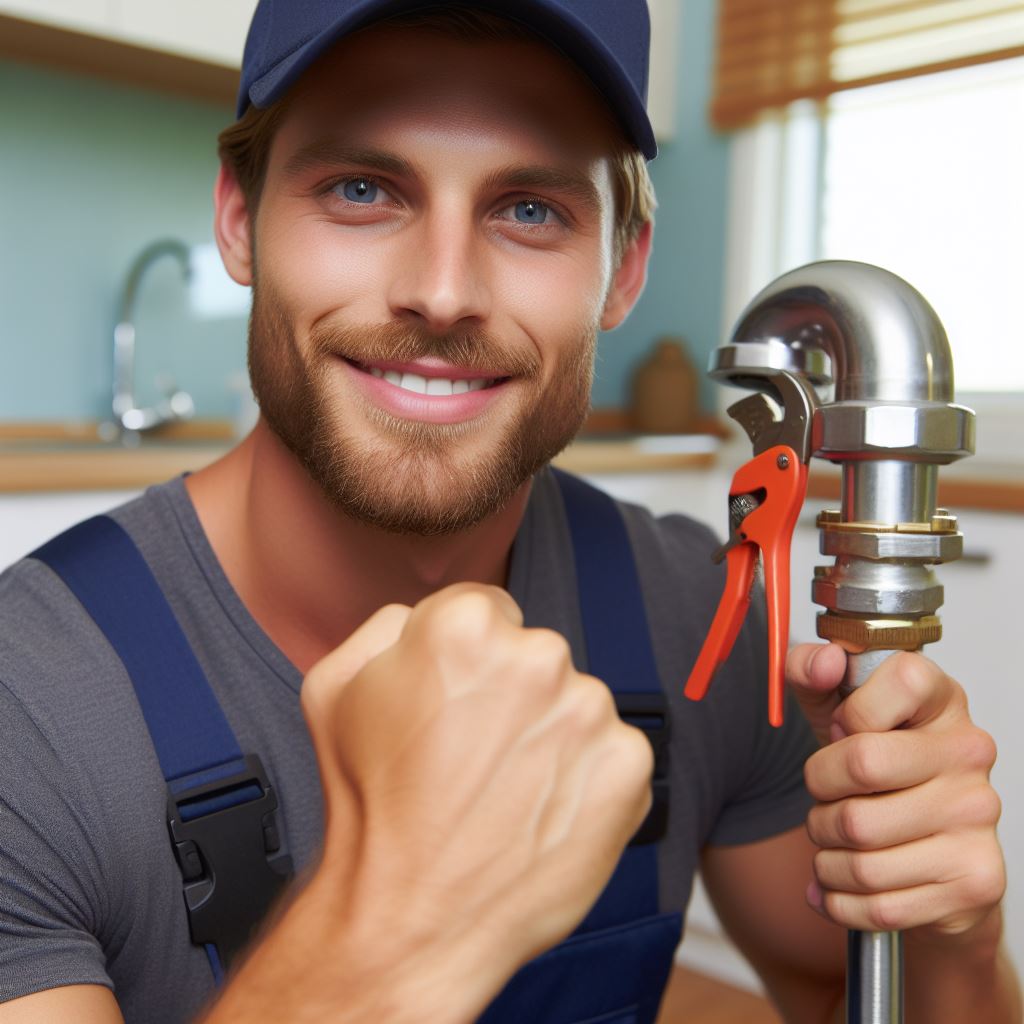Introduction
Plumbers play a crucial role in Australia as they ensure the proper functioning of essential infrastructure.
From installing water systems to repairing leaks and maintaining plumbing systems, plumbers provide vital services that impact our daily lives.
Becoming a plumber can be a fulfilling career choice for several reasons.
Firstly, there is a constant demand for skilled plumbers, ensuring job security and stability.
Additionally, plumbers often have the opportunity to work independently or start their own business, offering financial freedom and entrepreneurial prospects.
Furthermore, as a plumber, you have the satisfaction of solving problems and helping people.
Whether it’s fixing a toilet or repairing a burst pipe, you get to make a tangible difference in people’s lives.
This sense of accomplishment and the ability to provide a valuable service to the community can be highly rewarding.
Moreover, plumbing also offers opportunities for growth and specialization.
As you gain experience, you can choose to specialize in areas like gas fitting, drainage, or sustainable plumbing, enhancing your skills and marketability.
In Australia, becoming a plumber typically involves completing an apprenticeship, which combines on-the-job training with classroom learning.
This training equips you with the necessary skills and knowledge to excel in the field.
In review, the importance of plumbers in Australia cannot be overstated.
Becoming a plumber offers a rewarding career choice with job security, independence, and the opportunity to help others.
So, if you enjoy problem-solving, working with your hands, and making a positive impact, plumbing might be the right path for you.
Qualifications and Education
High School Education Requirements
To begin your journey towards becoming a plumber in Australia, you need to have a high school education.
Obtaining a high school diploma or an equivalent qualification is a basic requirement for entry into the plumbing industry.
A solid foundation in mathematics, physics, and technical subjects can be beneficial in this field.
Vocational Education and Training
After completing high school, aspiring plumbers usually enroll in vocational education and training (VET) programs.
These programs provide theoretical and practical training in plumbing techniques, systems, safety precautions, and relevant regulations.
They are designed to equip students with the fundamental skills and knowledge necessary for a successful plumbing career.
Apprenticeship Programs
Apprenticeship programs play a vital role in the development of plumbers.
They combine on-the-job training with classroom learning, allowing apprentices to gain practical experience under the guidance of experienced professionals.
Apprenticeships generally last for four years, during which apprentices receive supervised training in various aspects of plumbing, such as installation, maintenance, and repair.
Licensing and Certification Requirements
To work as a plumber in Australia, you must hold the appropriate licenses and certifications required by your state or territory.
Each jurisdiction has its own licensing requirements, which usually include completing a trade qualification, such as a Certificate III in Plumbing, and passing a plumbing examination.
These licenses ensure that plumbers meet the industry standards and regulations in their area of practice.
Ongoing Professional Development Opportunities
As the field of plumbing is constantly evolving, it is crucial for plumbers to engage in ongoing professional development.
Participating in workshops, training courses, and industry conferences allows plumbers to stay updated with the latest techniques, advancements, and safety standards.
Continuous learning enhances their skills, increases their employability, and helps them provide high-quality services to their clients.
In essence, becoming a qualified plumber in Australia requires meeting certain qualifications and completing the necessary education and training.
Earn a high school diploma, enroll in vocational education, secure licenses and certifications, and commit to continuous professional development for this career path.
By fulfilling these requirements, aspiring plumbers can pave their way towards a successful and rewarding plumbing career in Australia.
Skills and Personal Traits
Essential Skills Needed to Become a Successful Plumber
- Technical knowledge in plumbing systems, including installation, repair, and maintenance.
- Understanding of plumbing codes, regulations, and safety procedures to ensure compliance.
- Ability to read and interpret blueprints, drawings, and specifications to plan plumbing installations.
- Proficiency in using plumbing tools, equipment, and materials effectively and safely.
- Knowledge of different types of pipes, fittings, and fixtures used in plumbing systems.
- Familiarity with various heating, ventilation, and air conditioning (HVAC) systems.
- Capability to diagnose plumbing issues and provide appropriate solutions efficiently.
- Competence in working with different plumbing materials, such as copper, PVC, and steel.
- Understanding of water supply systems, drainage systems, and sewage disposal methods.
- Knowledge of gas supply systems and the ability to handle gas-related plumbing work.
Physical Fitness and Manual Dexterity
Becoming a plumber requires physical fitness and excellent manual dexterity to handle various tasks.
- Physically demanding tasks, such as lifting heavy pipes, crawling in tight spaces, and working in uncomfortable positions.
- Maneuvering tools and equipment with precision, especially in confined areas.
- Maintaining stamina and endurance to handle long hours of plumbing work.
- Having good hand-eye coordination for accurate installation and repairs.
Problem-Solving and Critical-Thinking Abilities
A successful plumber needs strong problem-solving and critical-thinking skills to tackle complex plumbing issues.
- Identifying the root cause of plumbing problems and creating effective solutions.
- Analyzing and evaluating different options before making sound decisions.
- Adapting to unexpected challenges and finding innovative ways to solve them.
- Considering potential consequences and risks before implementing plumbing solutions.
Attention to Detail
Paying attention to detail is crucial in the plumbing profession to ensure accurate and precise work.
- Installing pipes, fittings, and fixtures correctly to prevent leaks and other plumbing issues.
- Following precise measurements and aligning components accurately.
- Identifying potential hazards and addressing them proactively.
- Double-checking plumbing installations for any errors or faults.
Excellent Communication and Customer Service Skills
Plumbers often interact with clients and other professionals, requiring strong communication and customer service abilities.
- Effectively explaining plumbing issues and solutions to clients in a clear and concise manner.
- Active listening to understand clients’ concerns and needs.
- Providing exceptional customer service by being friendly, respectful, and professional.
- Collaborating with other tradespeople, architects, and engineers for successful project completion.
Developing the necessary skills and personal traits for a plumbing career is essential to become a successful plumber in Australia.
By mastering technical knowledge, physical fitness, problem-solving abilities, attention to detail, and communication skills, aspiring plumbers can thrive in this rewarding profession.
Read: Plumbing 101: A Beginner’s Guide in Australia
Steps to Becoming a Plumber in Australia
When it comes to becoming a plumber in Australia, there are several key steps that need to be taken. These steps include:
Researching and choosing the right plumbing trade
- Explore different areas of specialization within the plumbing industry.
- Consider the demand and job opportunities in each trade.
- Evaluate your own strengths and interests to choose the trade that suits you best.
Finding an apprenticeship
- Look for plumbing companies or contractors that offer apprenticeships.
- Reach out to local plumbing unions or industry associations for apprenticeship opportunities.
- Prepare a well-written resume and cover letter to apply for apprenticeships.
Completing the necessary education and training
- Enroll in a plumbing trade school or vocational training program.
- Complete the required courses and gain theoretical knowledge in plumbing.
- Obtain relevant certifications or licenses, such as a Certificate III in Plumbing.
Gaining practical experience through on-the-job training
- Work under the guidance of experienced plumbers during your apprenticeship.
- Learn practical skills like pipe fitting, installation, repair, and maintenance.
- Gather hands-on experience in different plumbing tasks and projects.
Preparing for and passing licensing exams
- Study thoroughly for the plumbing licensing exams specific to your state or territory.
- Review plumbing codes, regulations, and safety protocols.
- Practice solving plumbing problems and answering exam-style questions.
- Schedule the exam and ensure you meet all the requirements.
- Pass the licensing exam to officially become a licensed plumber.
Joining professional associations and networks
- Join reputable plumbing associations such as the Master Plumbers Association.
- Attend industry events, workshops, and seminars to network with other professionals.
- Stay up-to-date with the latest advancements and trends in the plumbing industry.
By following these steps, aspiring plumbers in Australia can enter the profession with the necessary skills, knowledge, and qualifications.
Remember that becoming a successful plumber requires dedication, hard work, and a continuous commitment to learning and improving your skills.
Read: Top Plumbing Trends in Australian Engineering
Your Personalized Career Strategy
Unlock your potential with tailored career consulting. Get clear, actionable steps designed for your success. Start now!
Get Started
Job Opportunities and Career Path
As mentioned earlier, becoming a qualified plumber in Australia can open up a wide range of job opportunities and career paths.
Let’s explore the different aspects of the plumbing industry and the options available.
Overview of the plumbing industry in Australia
- The plumbing industry in Australia is a thriving sector that plays a crucial role in ensuring the functioning of society.
- It encompasses various services such as installation, repair, and maintenance of water supply, drainage, and gas systems.
- Plumbers are in high demand, making it a stable and potentially lucrative career choice.
Demand for qualified plumbers
- The demand for skilled and qualified plumbers in Australia is continuously increasing.
- Population growth, urbanization, and infrastructure development contribute to the growing need for plumbing services.
- Qualified plumbers can find job opportunities in construction companies, plumbing contractors, maintenance firms, and government sectors.
Different career paths and specializations within plumbing
- Plumbing offers a range of career paths and specializations that allow individuals to focus on their areas of interest.
- Some common specializations within the plumbing industry include residential plumbing, commercial plumbing, industrial plumbing, and service plumbing.
- With further training and experience, plumbers can specialize in niche areas such as gas fitting, fire protection systems, or sustainable plumbing practices.
Opportunities for self-employment or starting a plumbing business
- One of the significant advantages of pursuing a career in plumbing is the opportunity for self-employment.
- Qualified plumbers can choose to work independently, offering their services to clients or establish their own plumbing businesses.
- Starting a plumbing business requires business acumen, licensing, and complying with industry regulations.
- However, it presents the potential for financial independence, job flexibility, and the ability to build a team of professionals.
In fact, the plumbing industry in Australia offers numerous job opportunities and career paths for those interested in this field.
The demand for qualified plumbers is high, ensuring job stability and potential financial rewards.
With specialization options and the opportunity for self-employment, plumbers can carve out successful and fulfilling careers in this dynamic industry.
Read: The Future of Plumbing Tech in Australia
Pros and Cons of Becoming a Plumber
When considering a career path, it’s crucial to evaluate both the advantages and disadvantages. The same applies to becoming a plumber in Australia.
Here, we will discuss the pros and cons of pursuing a career in plumbing.
Advantages of Being a Plumber
- Job Stability: Becoming a plumber brings stability due to the constant demand for plumbing services, ensuring high job security.
- Good Earning Potential:Plumbers, leveraging specialized skills, command higher rates, enjoying substantial income with experience and a solid reputation.
- Fulfilling and Satisfying Work: Individuals who relish hands-on work and problem-solving find satisfaction in plumbing. Restoring plumbing functionality or fixing complex issues yields accomplishment and fulfillment.
- Diverse Career Opportunities: Plumbing opens diverse career paths: work as a contractor, launch your business, or specialize in HVAC systems for ample opportunities.
- Flexibility and Independence: Plumbers can independently manage schedules, enhancing work-life balance. Self-employment offers higher earnings and decision-making authority.
Challenges and Potential Drawbacks
- Physical Demands: Plumbers actively lift heavy equipment, work in confined spaces, and stand for extended periods, requiring good physical fitness.
- Exposure to Hazardous Materials: Plumbers may come into contact with hazardous materials such as asbestos or lead. Handling these substances requires proper training, protective equipment, and adherence to safety protocols to minimize health risks.
- Irregular Working Hours: Plumbers must remain on call, working irregular hours, to promptly address plumbing emergencies, even during evenings, weekends, and holidays.
- Competitive Market: Plumbing services thrive on demand but face fierce competition. Plumbers must actively market, establish credibility, and track industry trends to stay competitive.
- Challenging Work Environment: Plumbers face challenges like unpleasant odors, dirty tasks, and adverse weather. They need mental and physical readiness for the job.
Overall, becoming a plumber in Australia offers several advantages such as job stability, good earning potential, and fulfilling work.
However, prospective plumbers must also consider the challenges of physical demands, exposure to hazardous materials, irregular working hours, and a competitive market.
By carefully weighing the pros and cons, individuals can make an informed decision about pursuing a career in plumbing.
Read: A Day in the Life of an Aussie Plumber
Uncover the Details: Top Carpentry Schools & Courses in Oz
Conclusion
In closing, becoming a plumber in Australia requires several steps and qualifications.
Firstly, completing a plumbing apprenticeship is essential, which includes both on-the-job training and attending technical courses.
Secondly, obtaining a Certificate III in Plumbing is necessary, as it demonstrates competency in the field.
Additionally, acquiring a Plumbing License is crucial, as it allows plumbers to legally work and carry out plumbing tasks.
Moreover, it is essential to have good problem-solving skills, physical fitness, and a keen eye for detail.
Aspiring plumbers should not be discouraged by the challenges they may face along the way.
The plumbing industry in Australia is thriving and offers numerous opportunities for growth and success.
By pursuing their goals and contributing to the industry, aspiring plumbers can make a significant impact and build a rewarding career.
It is a profession that not only provides financial stability but also allows individuals to assist and improve the lives of others by ensuring proper plumbing systems.
So, if you have a passion for plumbing and a desire to help others, don’t hesitate to embark on this exciting journey in Australia.




